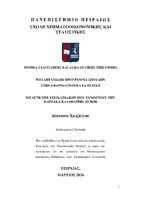Μελέτη των υποκλιμάκων που συνθέτουν την κλίμακα κατάθλιψης EUROD
A study of the sub-scales of the EUROD scale of depression

Προβολή/
Λέξεις κλειδιά
ΒιοστατιστικήΠερίληψη
Η κατάθλιψη κατέχει σημαντική θέση ως ψυχική διαταραχή στο σημερινή εποχή. Στην παρούσα εργασία εξετάζεται η συσχέτιση της κατάθλιψης και, πιο συγκεκριμένα, δύο διακριτών υποκλιμάκων της, με δημογραφικούς παράγοντες, κοινωνικοοικονομικούς παράγοντες, επικίνδυνες συμπεριφορές κ.λπ. σε άτομα ηλικιών 50 ετών και άνω στην Ευρώπη, συμπεριλαμβανομένης και της Ελλάδας. Τα δεδομένα που χρησιμοποιήθηκαν προέρχονται από το 8ο κύμα της Έρευνας για την Υγεία, τη Γήρανση και τη Συνταξιοδότηση στην Ευρώπη (SHARE). Στο 1ο κεφάλαιο παρουσιάζονται σημαντικές πληροφορίες για την ψυχική υγεία και την κατάθλιψη ως παράγοντες νοσηρότητας, καθώς και πώς διάφοροι δημογραφικοί και κοινωνικοί παράγοντες, επικίνδυνες συμπεριφορές και η κατάσταση φυσικής υγείας επιδρούν στην κατάθλιψη. Επίσης, αναλύονται τα επίπεδα την κατάθλιψης στην Ευρώπη. Στο 2ο κεφάλαιο αναλύονται ο ορισμός και οι ιδιότητες των ψυχομετρικών κλιμάκων, πως κατασκευάστηκε η κλίμακα της κατάθλιψης EUROD και τα χαρακτηριστικά της. Επιπλέον, αναφέρονται οι 2 υποκλίμακες της κλίμακας EUROD και παρέχονται πληροφορίες για τις 2 αυτές υποκλίμακες από σχετική βιβλιογραφία. Στο 3ο κεφάλαιο παρέχονται πληροφορίες για την Έρευνα για την Υγεία, τη Γήρανση και τη Συνταξιοδότηση (Survey of Health, Ageing and Retirement in Europe-SHARE) από την οποία αντλήθηκαν τα δεδομένα. Επιπλέον, κάνοντας χρήση του 8ου κύματος δεδομένων αυτής της έρευνας, πραγματοποιείται περιγραφική ανάλυση προκειμένου η μεταβλητή ενδιαφέροντος κατάθλιψη να χωριστεί σε δύο παράγοντες, την έλλειψη κινήτρου και την καταπόνηση του αισθήματος. Στο πλαίσιο της ανάλυσης αυτής παρουσιάζονται οι μέσοι όροι του κάθε συμπτώματος της μεταβλητής ενδιαφέροντος ανά φύλλο για κάθε χώρα ξεχωριστά σε ραβδογράμματα. Επιπλέον, παρουσιάζεται, η σύγκριση των συμπτωμάτων που βρέθηκαν ότι ανήκουν σε κάθε μία από τις δύο υποκλίμακες της μεταβλητής ενδιαφέροντος σε σχέση με αυτές που βρήκαν οι Castro-Costa. Στο 4o κεφάλαιο αναλύεται η έννοια της λογιστικής παλινδρόμησης και παρουσιάζονται 4 μοντέλα λογιστικής παλινδρόμησης (2 για την κάθε μία από τις δύο χώρες που επιλέχθηκαν) προκειμένου να διερευνήσουμε ποιες ανεξάρτητες μεταβλητές ευθύνονται για την εμφάνιση του κάθε παράγοντα σε κάθε μία από τις δύο χώρες που χρησιμοποιήθηκαν. Τα ευρήματα συγκρίνονται ανά παράγοντα για τις δύο χώρες. Στο 5o κεφάλαιο παρατίθενται τα τελικά συμπεράσματα της ανάλυσης μας, δηλαδή ποιες ανεξάρτητες μεταβλητές σχετίζονται με την εμφάνιση συμπτωμάτων κατάθλιψης. Όπως διαπιστώθηκε για τον παράγοντα έλλειψη κινήτρου οι μεταβλητές που βρέθηκαν είναι η κλίμακα αυτοαντιλαμβανόμενης υγείας, ο προσανατολισμός, οι περιορισμοί κινητικότητας, η μνήμη και η ικανότητα του να τα βγάζει κανείς πέρα, ενώ για την καταπόνηση του αισθήματος οι μεταβλητές που σχετίζονται με την εμφάνιση συμπτωμάτων καταπόνησης του αισθήματος είναι το φύλο, η κλίμακα αυτοαντιλαμβανόμενης υγείας, οι περιορισμοί κινητικότητας, η μνήμη και η ικανότητα του να τα βγάζει κανείς πέρα.


